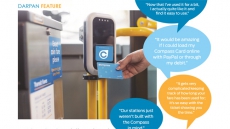How to turn errands with your child into a fun money-management exercise
There’s not a parent alive who doesn’t dread bringing their children with them when running to the store. There is a way to make shopping trips with the kids less painful while also teaching them important money management skills. Below are my tips for teaching your kids about money before, during and after the store.
1 Allowance
In order for your child to learn how to budget, they need to have one important thing – money! Yes, I’m talking about allowance. I believe in starting allowance as early as four years old. I know, the “right” way to give your kids an allowance is a topic of conversation and source of stress for many parents. However, as a financial professional, I can officially tell you that there’s very little proven “right” or “wrong” when giving your child an allowance. As long as you follow some basic ground rules and stay consistent, you (probably) won’t completely ruin your child’s money management skills for life. And keep in mind the purpose of allowance. It’s simply a tool they can use to practice and learn about money management.

2 Spend/Share/Save
Every time your child receives money, whether it’s allowance or gift money, make sure they first put some of it away for savings, some for giving and the rest can go towards spending. This “three piggy bank system” gets them into the habit of not spending everything they make. I like using clear mason jars as piggy banks, so they can see their money grow (literally). It doesn’t really matter how much they put into each jar, as long as they put something into each.

3 The Spend Jar
Explain the jars to your child. For the purposes of this activity, we are focusing on the spend jar. Tell your child that the money they put into this jar is for “Whatever they want, within reason (and mom determines reason).” Give your child some guidelines, like they can’t buy something that’s alive, dangerous or has more than 300 gm. of sugar.

4 Stop buying “stuff”
This goes hand in hand with number three, stop buying them stuff. You know what I mean. At the grocery store when your child is begging you to buy them some gum, cinnamon-flavoured toothpicks, sprinkles, or a bottle opener shaped like a frog. We all are guilty of it once in a while. We buy them that awful bottle opener that they have zero use for, but it will give us seven minutes of peace, so we get it for them. This is the most painful step of all of them – stop doing that.
Be sure to warn them before you venture to the store. Tell your child that having their own money to spend means that you aren’t going to buy her anything on this trip. She can buy something as long as she has enough ‘Spend’ money. Their spend money then becomes the “Mom can I have that?” fund.
One of the most important budgeting concepts a child can learn is that every purchase is a decision. Every time they use their money for one thing, it means they can’t use their money for something else. Then every time you step out of the house with your child to run an errand, tell your child to bring their spend money. Even if you are going to the hairdresser and dry cleaner; you may think you’re safe, but you never know when a seemingly innocent store will have a bouncy ball machine.

5 Bite Your Tongue
Let them buy that horrific toy that you know they will lose, break forget about or hate within 45 minutes. Every time they say “can I have it” you answer, “of course, as long as you have enough money.” Let them make mistakes. Bite your tongue and let them buy the overpriced emoji=shaped squishy ball. Let them experience the disappointment first-hand of making a bad money decision. This is not to be sadistic; it’s the only way they will learn and then want to avoid the same mistake later. Allowing them to make mistakes now gives them practice, when there are no real consequences. You don’t want them to learn how to make spending mistakes at age 20 when they are buying their first car or renting their first apartment.
6 Discuss
Finally, talk to them about it. Ask them how they feel about the toy they purchased breaking. What else could they have done with that money? Gently suggest next time maybe waiting a day before they buy a toy, to make sure they really want it. Which by the way, is another win/win for the parents.

ABOUT THE AUTHOR
Liz Frazier is the author of Beyond Piggy Banks and Lemonade Stands: How to Teach Young Kids About Finance, a guide to help parents, caregivers and educators teach elementary school kids the financial basics. In addition to her CFP, Frazier holds an MBA from Wake Forest University and is a member of the Financial Planning Association (FPA) and the National Association of Personal Financial Advisors (NAPFA). She is also a regular finance contributor on Forbes.com, focusing on everyday personal finance that anyone can understand and use; her articles provide real world simple, accessible, and entertaining financial advice.






